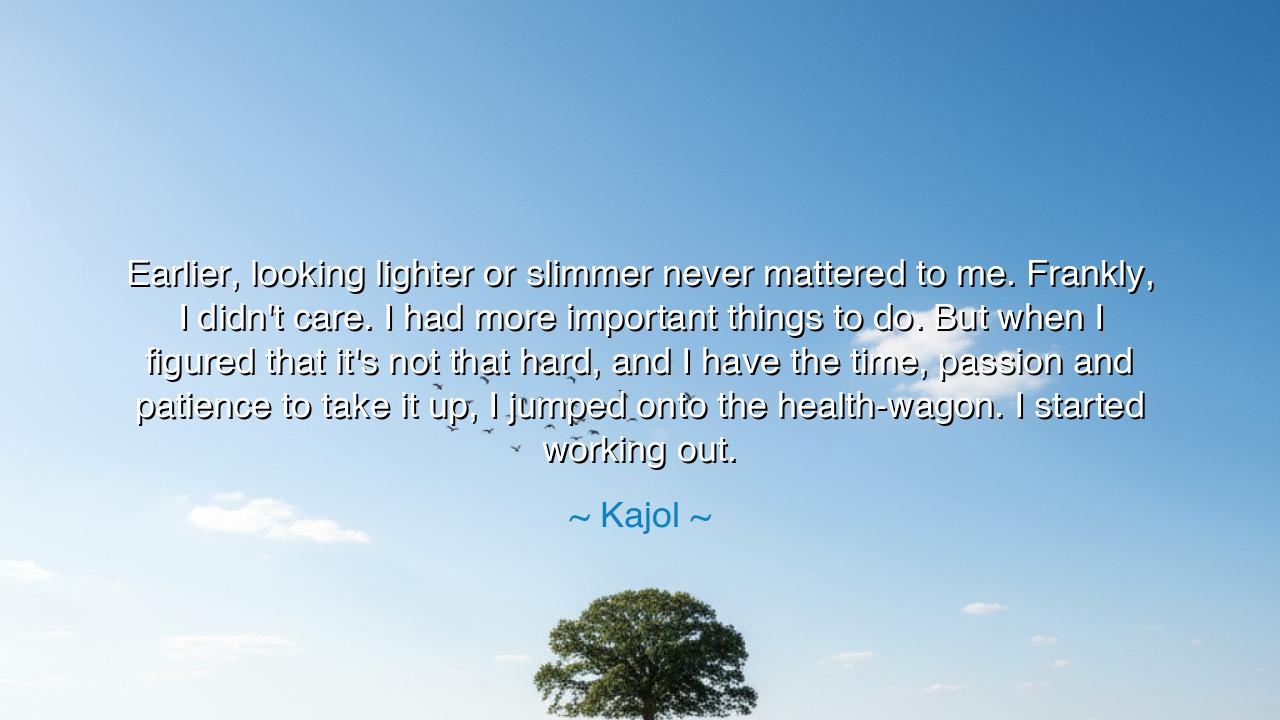
Earlier, looking lighter or slimmer never mattered to me.
Earlier, looking lighter or slimmer never mattered to me. Frankly, I didn't care. I had more important things to do. But when I figured that it's not that hard, and I have the time, passion and patience to take it up, I jumped onto the health-wagon. I started working out.






Kajol, the luminous actress, once spoke with honesty and strength: “Earlier, looking lighter or slimmer never mattered to me. Frankly, I didn’t care. I had more important things to do. But when I figured that it’s not that hard, and I have the time, passion, and patience to take it up, I jumped onto the health-wagon. I started working out.” At first, her words may seem only about the body, about the choice to grow fitter. Yet beneath them flows a greater wisdom: that each season of life brings new priorities, and when strength, desire, and discipline align, transformation becomes possible.
In the ancient days, philosophers taught that the body is the vessel of the spirit, a temple for the soul. Yet they also warned against vanity, reminding us that to pursue beauty alone is folly. Kajol echoes this truth. She cared not for being slimmer, for she saw higher tasks before her. Her heart was set on work, family, and art. But in time, when the burden of “more important things” grew lighter, she discovered that health itself is not vanity but vitality. The health-wagon she describes is not a chariot of pride, but a journey toward balance.
Her words shine with another great teaching: the power of timing. In youth or in busyness, the body may be neglected, for energy feels infinite. But there comes a moment when one realizes that care for the self is not a distraction, but a duty. Just as the farmer, once free from the frenzy of planting, tends his tools in the quiet season, so too Kajol turned to tend her body when time and patience allowed. Transformation, then, is not only about will—it is about the wisdom to seize the right moment.
Consider the life of Mahatma Gandhi, who in his youth lived without particular discipline of health. But when he understood that his strength must serve a nation, he embraced simplicity, fasting, and walking as acts of both body and spirit. His transformation came not from vanity, but from purpose. Kajol’s story, though personal, reflects the same principle: when passion and patience meet with the right purpose, even great change can be embraced with joy.
Another teaching emerges from her confession: change need not be forced. Kajol did not begin her journey out of guilt, nor from the lash of others’ expectations. She says clearly: “I didn’t care.” And indeed, indifference to shallow judgments is strength. But when she realized that fitness was within reach, and when her heart found delight in the process, she chose to step forward. This is the lesson: that change, to endure, must spring not from compulsion, but from willingness. Passion, not pressure, sustains the long road of growth.
There is also the virtue of patience in her words. For to begin working out is not to see immediate transformation, but to embrace a rhythm of steady effort. In this way, Kajol teaches that the same patience she gave to her art, her craft, and her family, she now gives to her health. And so must we: for the body, like the soul, responds not to haste but to faithful, daily tending. Patience is the soil in which all transformation grows.
So, dear listener, take this wisdom to heart: your body is not an enemy, nor a burden, nor a tool for vanity. It is a companion in your journey, worthy of care. Do not despise the times when health feels impossible, but watch for the moment when time, passion, and patience align. Then, like Kajol, step onto the health-wagon, not with shame, but with joy. Begin with small steps, and let them grow into a rhythm of life. For when you honor your body with balance, you also honor your spirit.
And thus the teaching endures: true transformation does not begin with others’ demands, but with your own awakening. Wait for your moment, embrace it with passion, and walk forward with patience. For in caring for the vessel, you strengthen the voyager, and the journey of life becomes longer, lighter, and filled with renewed strength. Health is not vanity—it is power, it is balance, it is life.






AAdministratorAdministrator
Welcome, honored guests. Please leave a comment, we will respond soon